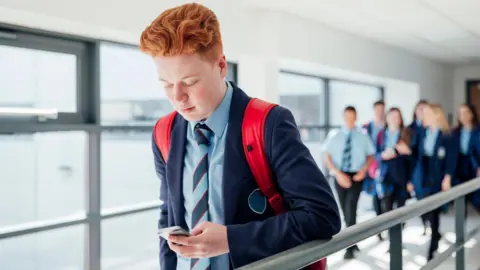 Getty Images
Getty ImagesBanning phones in schools should be a decision for head teachers and not “imposed nationally by the government”, England’s children’s commissioner has said.
Nine in ten secondary schools restrict the use of smartphones, according to a survey of 19,000 schools and colleges commissioned by Dame Rachel de Souza.
Dame Rachel said children were racking up hours of screen time at home instead, and that parents needed more help managing their children’s online habits.
Her comments come as the general secretary of the UK’s largest teaching union said a government ban on phones would “take the pressure off schools”.
Dame Rachel’s survey suggests 99.8% of primary and 90% of secondary schools limit pupils’ use of phones during the school day.
Most primary schools (76%) require pupils to hand in their phones or leave them in a secure place during the day, whereas most secondary schools (79%) say phones must be kept out of sight and not used.
The survey did not cover how thoroughly these policies are implemented, or their success rate.
A separate survey of 502 eight to 15-year-olds, also commissioned by Dame Rachel, suggests:
- 69% of children spend more than two hours a day on a device
- 23% of children spend more than four hours a day
“These children are not spending these hours on their phones while sat in school,” Dame Rachel said in a new report. “It goes much wider than that.”
She said parents and carers “need to be supported in managing their children’s online activities and setting appropriate boundaries”, and technology companies must “take responsibility for making the online world safe by design”.
Schools, meanwhile, should “continue to have clear policies on phone use” and also educate young people about online risks.
“Any head teacher who decides to ban mobile phones from their school has my full backing – but it should always be their choice, based on their knowledge of what’s best for the children in their own classrooms, not a direction imposed nationally by the government,” Dame Rachel said.
However, her report also recommended the government should “conduct more research into the potential benefits of wider restrictions on children’s use of phones, particularly social media”.
A government spokesperson said social media platforms already have to take down illegal material under the Online Safety Act, and the same law would soon protect children from other harmful online content including misogyny and violence.
And the government has said there is already guidance on how schools can restrict the use of phones, which head teachers can decide how to put into practice.
But Daniel Kebede, the general secretary of the National Education Union, said he believed a government ban on smartphones in schools would “assist parents, but also take the pressure off schools”.
“Most schools do have rules in place, but [a ban] would create a uniformity across the school system, which would be very important and ensure that a new culture was developed in which smartphones were not in possession during school time,” he said.
He said the UK should consider following in Australia’s steps with a social media ban for under-16s, adding: “We have to view the online world, social media and mobile phones in the same prism as we view the tobacco companies. These are harmful to our young people and they need regulating.”













